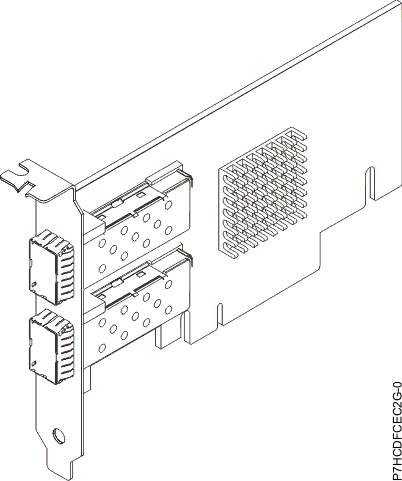PCIe3 FPGA Compression Accelerator Adapter (FC EJ13; CCIN 59AB)
Learn about the specifications and operating system requirements for the feature code (FC) EJ13 adapter.
Overview
FC EJ12 and EJ13 are both the same adapter with different feature codes. FC EJ12 is a full-height adapter and FC EJ13 is a low-profile adapter. See CAPI Compression Accelerator Adapter (FC EJ1A and EJ1B; CCIN 2CF0) for compression accelerator adapters with greater compression acceleration and CPU load reduction.
The PCIe3 FPGA Compression Adapter is a PCI Express (PCIe) generation 3 (Gen3), x8 adapter. The adapter can be used in either a x8 or x16 PCIe Gen3 slot in the system. The PCIe3 FPGA Compression Accelerator Adapter implements the well-defined, open standard DEFLATE compressed data format. This data format is widely accepted through zlib, gzip, Java and other applications. Within the gzip and zip file formats, the adapter is the standard for compressed data exchange. The adapter's high compression bandwidth reduces the latency for a single compression job significantly. Its aggregate throughput allows the adapter to keep pace with common I/O traffic and offers reduced data for storage and network traffic. Additionally, the adapter has no impact on most I/O traffic and in some cases will have a positive effect. The adapter also enables good standard compression in cases where software overhead prevents it.
- Store or transmit large amounts of data that average over 100 MB/s
- Expensive storage with high storage bandwidth, where the accelerator’s compression ratio, compared to fast software compression, yields significant savings
- Applications that need a high average throughput of data compressed
- Handling high peak throughput of data when software compression is limited
- When low latency for individual compression streams is required and it is more difficult to run in parallel on many CPUs
- When the standard DEFLATE compression format is required for interchange as used in gzip, zlib, zip, or JAR (Software compression methods such as LZ4 or LZS with lower compression ratios and high bandwidth on CPUs are not an option in that case)
- Compression or a mix of compression and decompression is the main bottleneck.Note: Decompression alone can sometimes still be done in software with many cores in parallel. The adapter supports full speed decompression for all compliant compressed input regardless of whether it was compressed by hardware or software.

Specifications
- Item
- Description
- Adapter FRU number
- 000NK006 (Designed to comply with RoHS requirement)
- I/O bus architecture
- PCIe3 x8
- Slot requirement
- One PCIe x8 or x16 slot (Low-profile)
- Voltage
- 3.3 V, 12 V
- Form factor
- Full-height (FC EJ12) and short, low-profile (FC EJ13)
- Maximum number
- For details about the maximum number of adapters that are supported, see PCIe adapter placement rules and slot priorities and select the system you are working on.
- Attributes provided
- High throughput compression that saves storage and I/O bandwidth with little or no overhead
- CPU offload and PCIe interface with negligible software load frees up CPU cores for higher value computation or licensed software
- Lower power consumption by offloading the CPU intensive compression to an FPGA
- Widely used zlib and gzip standard format for data interchange
- Up to 1.8 GB/s compression and decompression throughput
- 3-25x speed up achievable
- Compression ratio near software zlib and gzip
- Multiple uses including genomics, data center, cloud, and backup solutions
Operating system or partition requirements
- AIX®
- AIX 7.1, Technology Level 3, Service Pack 2, or later
- AIX 6.1, Technology Level 9, or later
- Linux
- Red Hat Enterprise Linux 7.2, and later include the GenWQE Linux drive
- Red Hat Enterprise Linux 7.1, or laterImportant: See Generic Work Queue Engine (GenWQE) introduction on how to install the driver.
- Red Hat Enterprise Linux 7, or later
- For support details, see the Linux Alert website.
- For additional information regarding firmware level and additional software installations, see Fix Central .
- To use the PCIe3 FPGA Compression Accelerator Adapter, the following software packages must be
downloaded at the IBM® Service and Productivity Tools
website
:
- genwqe-zlib: Hardware accelerated zlib
- genwqe-tools: Tools to analyze adapter functionality plus hardware accelerated genwqe_gzip and genwqe_gunzip
- For details on how the adapter can be used to accelerate your application, please refer to the Generic Work Queue Engine (GenWQE) Application Programming Guide published on IBM developerWorks.
